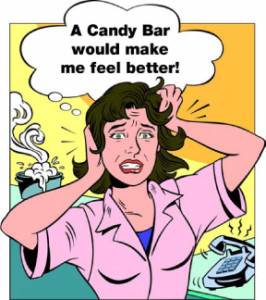Alright, it’s confession time: I’d be lying if I said I hadn’t battled with emotional eating in a big way. And I admit this to you here, dear reader, because if you’ve ever struggled with binge-eating from stress or anxiety, then you’ll know that it can be quite damaging – not just to your weight-loss efforts, but to your motivation as a whole. We can’t pretend that emotional eating isn’t a problem, because it is.
 We don’t always eat simply to satisfy hunger. We also turn to food for comfort, relief from depression or stress, or as a reward. But this habit of eating is not constructive. It dampens your motivation. And, at the end of the day, it’s downright disheartening when you emerge from a binge and find yourself even more upset that you’ve sabotaged any efforts to take control of your diet. I think many health forums skim over this issue by assuming that it’s easy to ‘eat right’ all the time – the reality for many of us is that it’s not. And it can be very embarrassing to admit that you’re not losing weight because, quite often, you end up reaching for a box of cookies when you’re anxious or upset as naturally as you reach for a box of tissues to dry your tears.
We don’t always eat simply to satisfy hunger. We also turn to food for comfort, relief from depression or stress, or as a reward. But this habit of eating is not constructive. It dampens your motivation. And, at the end of the day, it’s downright disheartening when you emerge from a binge and find yourself even more upset that you’ve sabotaged any efforts to take control of your diet. I think many health forums skim over this issue by assuming that it’s easy to ‘eat right’ all the time – the reality for many of us is that it’s not. And it can be very embarrassing to admit that you’re not losing weight because, quite often, you end up reaching for a box of cookies when you’re anxious or upset as naturally as you reach for a box of tissues to dry your tears.
But whether your aim is to lose weight or achieve an athletic goal, your diet is crucial. In order to achieve your goals, finding the motivation and the willpower to eat well – to eat a balanced diet, to level out your calorie intake and to listen to your natural hunger pangs – is vitally important. Not to mention, taking control of your diet makes food more enjoyable because you’re more likely to savour and appreciate it. So cutting out the emotional eating is, ultimately, a win/win situation.
Here are our favourite tips to gaining back that control in a measured, healthy manner – and getting back on track to achieving your goals! On your marks, right?
- Have a ‘hunger check’. Ask yourself: are you really hungry? There’s a big difference between feeling physically hungry and needing to eat to fill an emotional void. Be mindful of your body and check yourself before you reach for food – do you really need to eat that?
- Keep a food diary. Write down what you eat, how much you eat, when you eat, how you’re feeling when you eat and how hungry you are. Over time, you may see patterns emerge that reveal the connection between mood and food. Once you’ve worked this out, you can start to make changes to your lifestyle that will help you at vulnerable moments.
- Cut temptation. Don’t keep supplies of comfort foods in your home if they’re hard for you to resist. Never go grocery shopping when you’re feeling overly emotional (or hungry). When you’re in an environment where your favourite comfort foods are easily accessible, getting rid of them altogether will mean you have to make more effort when you’re feeling low – so you’ll be more likely to check yourself when you find yourself in a moment where you’d normally be prone to reaching for a snack when you’re not actually hungry.
- Chew your food. Okay, this sounds like a no-brainer, but seriously: take the time to really enjoy your food. All too often, we rush our food out of habit, or because we’re distracted by something more important – think TV, social media, busy lifestyles. But think about how differently you eat when you’re out for a really nice dinner with good people – you pace yourself, you mull over your meal, you enjoy it more. Make mindful eating a habit all the time. Pause between taking bites, chew your food more thoroughly, and pay attention to your breathing and how full you feel. You’ll find yourself appreciating what you’re eating!
- Fight boredom. Instead of snacking when you’re not truly hungry, distract yourself. Take a walk, watch a movie, play with your cat, listen to music, surf the internet or call a friend. Brew some tea or coffee and enjoy a book. Do some simple yoga and get back in tune with your body. Go to the gym! There’s a million things you could be doing – so do those things instead!
- Get support. Surround yourself with good people – family and friends, or even a support group – if you have issues you need to talk through. Whether it’s something really bad, or you’re just having an off-day, you know these people are always there for you so go to them and let them put a smile back on your face. Emotional eating happens when we shut ourselves away and become alone with our thoughts; when you’re having a rough time, go to the people who’ll make you feel good again, rather than seeking that same comfort in calories.
- Don’t deprive yourself. Achieving a weight-loss goal is not about depriving yourself – while you may limit yourself to a point, it’s important not to cross the line too far. Going ‘on a diet’ to achieve weight loss often means we find ourselves limiting calories too much, eating the same foods frequently (read: losing the enjoyment in food) and banishing the treats we enjoy. This is counter-productive in the long run: it will increase food cravings, especially in response to emotions. Let yourself enjoy an occasional ‘cheat’ meal and get plenty of variety to help curb cravings.
- Snack right. Suss out what your food weaknesses lie and try to find a healthier alternative. Ludicrious as that sounds, it’s totally do-able! For example, I often find myself craving sweet, sweet, sweet foods, in large quantities. So instead of snacking on piles of pick ‘n mix, I freeze berries and chunks of pineapple and grab a bowl of them while I’m watching TV – they take ages to finish and they’re absolutely delicious. Just having something to pick at is often the allure of snacking on big bags of crisps or chocolates – swapping those for a large portion of something low-calorie (such as unbuttered popcorn or a bowl of salad leaves with low-fat dressing) will cut mad calories out of your snacking habits but still give you that little filler that you may need.
- Setbacks are a learning curve. If you have an episode of emotional eating, be kind to yourself! Forgive yourself and start afresh the next day – don’t limit your calories to much to make up for your binge, just get right back on track with your diet plan and remember one bout of emotional eating isn’t going to to ruin your entire effort. Instead, try to learn from the experience and make a plan for how you can prevent it in the future. Focus on the positive changes you’re making in your eating habits and give yourself credit for making changes that’ll lead to a healthier ‘you’.
 Supplement Judge Unbiased Supplement Reviews – Do they really work??
Supplement Judge Unbiased Supplement Reviews – Do they really work??




